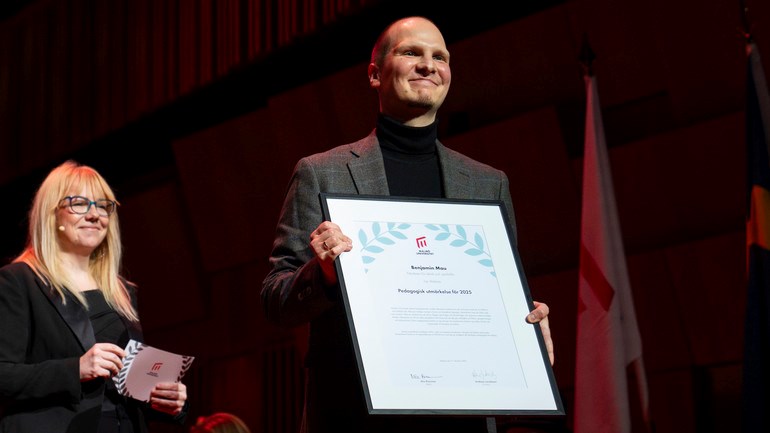Benjamin Maus receives award for creative and engaging teaching

Staying curious is what keeps Benjamin motivated and inspired.
Benjamin Maus, doctoral student at the Faculty of Technology and Society, is one of the recipients of the Malmö University’s Teaching Award 2025.
For him, teaching is about much more than sharing knowledge – it’s about creating meaningful encounters where both students and teachers learn from one another.
– I feel incredibly honoured and happy about receiving this award – especially since it is appointed by the students, says Benjamin. It always takes two sides to create a meaningful learning experience, and I’m grateful for all the encounters as part of lectures, workshops, projects, or thesis work over the past years.
He emphasises that this recognition is not something achieved alone.
– I also feel thankful for the guidance and coaching I have received from my colleagues at Malmö University since my very first day. The trust and openness I’ve experienced as a young lecturer – and now doctoral student – have been so important to make this happen.
For Benjamin, the award encourages him to continue evolving as a teacher.
– More than anything, it is a fantastic motivation to keep improving my teaching. I really enjoy being in the classroom and want to continue contributing my small part in inspiring and supporting others on their journeys. Personally, it is also lovely to see how my PhD work has helped me – rather than limited me – in my teaching, he says.
Benjamin’s approach to teaching is shaped by his background in interaction design, where structure, storytelling, and engagement go hand in hand. He sees each class as an interaction that can be purposefully designed through elements such as the visual design of slides, or the flow of group activities. Variety, creativity, and strong participatory elements are his signature.
– I’m probably lucky to be teaching in a field that naturally supports creative and varied methods. I use many workshop formats, including more unconventional ones like bodystorming, which combines role-play and improvisation. I also teach tutorials for tools such as Figma and ProtoPie, and I’ve had great collaborations with partners like Arduino and the K3 workshop team.
He is passionate about helping students dive into hands-on creation early in the learning process – even when the underlying technology is advanced.
– I like to help students start creating and testing interactive ideas quickly. For example, I use a tool called Teachable Machine, which lets anyone build a simple machine learning model without writing code. This way, students can prototype experiences that react to gestures or sounds, while focusing on the concept and user experience rather than the technical implementation, he says.
Benjamin is also attentive to adapting his teaching to different student groups and cultural contexts.
– Different programmes come with different previous experiences, vocabulary, and mindsets. Bachelor’s students might have a more local context, while master’s students often bring international perspectives. There’s a bit of ‘code-switching’ needed to make your message resonate – and my background as a designer and consultant, where adapting across contexts is part of the job, has probably been very helpful here, he explains.
Staying curious is what keeps him motivated and inspired.
– That’s one of the parts I really enjoy. I follow a number of newsletters, read research papers in design and HCI, talk with colleagues, attend conferences, and try out new tools. All of that keeps my energy up and helps me keep learning something new every day.
The students’ motivation
Through varied teaching methods, Benjamin Maus supports students in achieving the course objectives in an effective and enjoyable way. He gives clear examples, breaks down complex concepts into manageable steps and follows up with each student. He takes students seriously, picks up on questions and concerns, and adapts his teaching accordingly. Benjamin Maus ensures that different perspectives are highlighted and that everyone is given the opportunity to contribute during group exercises and discussions. His enthusiasm is contagious and makes students feel seen, heard and inspired to continue learning.
